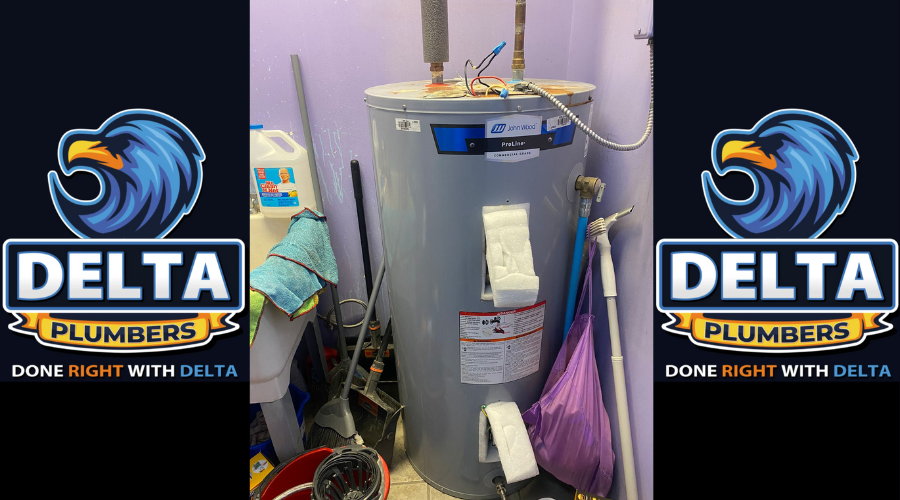Hot water is a daily necessity—whether for morning showers, dishwashing, or laundry. Your water heater quietly serves this need until something goes wrong: no hot water, strange noises, or a leaking tank. At this point, the question arises: When to Repair vs Replace Your Water Heater?
For Ontario homeowners, making the right choice can save hundreds of dollars and prevent future plumbing emergencies. In this comprehensive guide, we’ll walk you through every key consideration—age, efficiency, cost of repairs, brand reliability, warning signs, and the dangers of delay. Let’s dive into the essential knowledge every homeowner needs to make an informed decision.

Picture Source – Delta Plumbers
Is It Better to Replace or Repair a Water Heater?
This is often the first question homeowners ask. The answer isn’t always clear-cut, but several factors can guide you.
1. Age of the Unit
The typical lifespan of a traditional tank water heater is 8–12 years, while tankless water heaters may last up to 20 years. If your water heater is nearing or beyond this range, replacement is usually the more cost-effective option.
2. Frequency and Cost of Repairs
If you’ve already repaired your water heater multiple times in the past two years, investing more money might not make sense. As a general rule:
- If a repair costs more than 50% of a new unit, replacement is the better choice.
3. Energy Efficiency
Older units consume more energy. Upgrading to an energy-efficient model, especially an ENERGY STAR®-certified heater, can reduce energy bills and qualify you for local rebates in Ontario.
4. Safety Considerations
Sediment buildup, faulty thermostats, or a cracked tank can pose serious risks, including scalding, gas leaks, or flooding. In such cases, replacement is often safer than repair.
5. Availability of Parts
Sometimes older models have discontinued parts, making repairs impractical or very expensive.
💡 Pro Tip: Regular maintenance can extend the life of your unit, but when repairs become frequent or costly, it’s smarter to replace.
Also Read: Top 7 Summer Plumbing Issues and How to Prevent Them

Picture Source – Delta Plumbers
How Do I Know When to Replace a Hot Water Heater?
There are several telltale signs that your water heater is on its last legs. Paying attention can prevent a major plumbing disaster.
1. Inconsistent or No Hot Water
If your heater struggles to produce hot water or runs out too fast, the heating element might be failing. Occasional cold spurts may also point to sediment buildup in the tank.
2. Rust-Colored Water
If brown or rusty water flows from your taps, the interior of the water tank may be corroding. This is an early sign that the tank might soon leak or burst.
3. Rumbling or Popping Sounds
These noises are usually caused by hardened sediment at the bottom of the tank. Over time, it reduces efficiency and causes overheating, which damages the tank lining.
4. Leaks Around the Base
A leaking tank typically can’t be repaired. If water is pooling around your heater, replacement is urgent.
5. Unexplained Rise in Energy Bills
As your heater ages, it becomes less efficient. If you notice higher bills despite no increase in usage, your unit might be working harder than necessary.
Also Read: Eco-Friendly Plumbing Upgrades Every Homeowner Should Know in 2025

Picture Source – Delta Plumbers
Should I Repair a 20-Year-Old Water Heater?
In most cases, no, you should not repair a 20-year-old water heater. Here’s why:
1. Efficiency Loss
Older models use more electricity or gas to heat the same amount of water. They lack modern insulation and energy-saving technology.
2. Risk of Sudden Failure
At 20 years old, a water heater is well past its expected service life. It can fail without warning, potentially causing flooding or other damage.
3. High Repair Costs
Parts may no longer be available. Even if they are, replacing old components (heating elements, pressure valves, etc.) won’t restore the full efficiency of a modern unit.
4. Cost of Operation
You’ll spend more money running an old unit than the one-time cost of replacement. Many homeowners recoup their investment within a few years through energy savings.
💡 Real-Life Tip: In Ontario, homeowners often qualify for rebates when switching to high-efficiency tankless water heaters or ENERGY STAR® units. Ask your plumber about available local incentives.
Also Read: Emergency Plumbing Repairs: What to Do Before the Plumber Arrives

Picture Source – Delta Plumbers
What Is the Most Reliable Brand of Hot Water Heater?
Selecting a reputable brand ensures longevity and fewer repairs. Based on industry reviews, warranty terms, and homeowner satisfaction, the following are top picks:
1. Rheem
Rheem is known for its energy-efficient models, long warranties, and wide product range (both tank and tankless).
2. Bradford White
Popular among professional plumbers, this brand offers durable, made-in-USA water heaters with powerful performance and premium insulation.
3. AO Smith
AO Smith produces high-capacity and commercial-grade heaters with good after-sales support.
4. Navien (Tankless)
If you’re looking for a tankless model, Navien is one of the most efficient and technologically advanced brands on the market.
5. Kenmore & Whirlpool
Although these are often sold through big-box retailers, they offer good performance for residential use with reliable warranty support.
🛠 Pro Tip: No matter the brand, proper installation by a licensed plumber in Ontario ensures better performance and fewer warranty issues.
Also Read: Professional Drain Cleaning: Why It Is Essential

Picture Source – Delta Plumbers
How Do I Know if My Water Heater Needs a New Element?
A failing heating element is a common problem in electric water heaters. Here are the signs:
1. Water is Lukewarm or Cold
This is the most obvious indicator. If your tank still holds water but doesn’t heat it properly, the upper or lower element may have failed.
2. Circuit Breaker Trips Frequently
A short-circuited heating element can cause the breaker to trip, affecting your water heater’s power supply.
3. Slow Hot Water Recovery
If it takes a long time to reheat water after usage, your heating elements may be worn out.
4. Testing the Element
A licensed plumber can use a multimeter to test the resistance of the element. If there’s no continuity, replacement is necessary.
✅ Quick Fix: Replacing a water heater element is generally affordable and much cheaper than replacing the entire unit, especially if the rest of the heater is in good condition.
Also Read: Detect Hidden Plumbing Leaks Before They Cause Damage

Picture Source – Delta Plumbers
How Long Does It Take a Professional to Replace a Hot Water Heater?
On average, it takes a professional 2 to 4 hours to replace a water heater, depending on several factors:
Factors That Affect Installation Time:
- Type of unit (tank vs tankless)
- Accessibility of the installation location
- Permits and safety codes
- Upgrading connections (electrical or plumbing modifications)
Here’s a general breakdown:
- Tank Water Heater Replacement: 2–3 hours
- Tankless Water Heater Replacement: 3–5 hours
- New Installations (first-time setups): 6–8 hours or more
🧰 Licensed Plumber Advantage: Hiring an experienced plumber ensures code compliance, warranty protection, and same-day hot water restoration.
Also Read: Spring Plumbing Issues and How to Prepare for Them

Picture Source – Delta Plumbers
What Happens If You Don’t Replace Your Water Heater?
Delaying a necessary water heater replacement can lead to serious consequences:
1. Water Damage
A leaking tank can cause significant structural damage to your home. Repairs may run into thousands of dollars, especially if mould remediation is needed.
2. No Hot Water
Sudden failure means no showers, no laundry, and no dishwashing. For families, this can be highly disruptive.
3. Increased Utility Bills
Old heaters use more gas or electricity to heat water. Delaying replacement results in unnecessarily high monthly costs.
4. Safety Risks
Gas leaks, carbon monoxide buildup, and scalding temperatures are all possible with deteriorating units.
5. Warranty Expiry
Most water heaters have a 6–12-year warranty. Once expired, any repair costs fall entirely on the homeowner.
🚨 Important: If your water heater shows signs of rust, leaks, or noise, it’s a red flag. Ignoring it may cost you much more in the long run.
Conclusion –
Replacing a water heater is a major decision, but ignoring the warning signs can lead to even costlier issues. Here’s a quick recap to guide your decision:
| Criteria | Repair | Replace |
| Age | Under 8 years | Over 10 years |
| Type of Issue | Minor (thermostat, valve, element) | Major (leaks, corrosion, failing tank) |
| Efficiency | Still high | Low efficiency, rising bills |
| Cost | Less than 50% of the replacement | More than 50% of the replacement |
| Safety | No hazards | Safety risk present |
Why Choose Delta Plumbers for Water Heater Services in Ontario?
At Delta Plumbers, we’ve been helping homeowners across Ontario with honest advice, reliable repair, and certified installations. Whether your water heater needs a quick fix or a full replacement, we offer:
✅ Same-day emergency service
✅ Transparent pricing
✅ Energy-efficient options
✅ Top-rated brands
✅ Expert advice based on your home’s needs
📞 Call us today or book online to schedule your water heater inspection and service!
Your comfort is our commitment.









